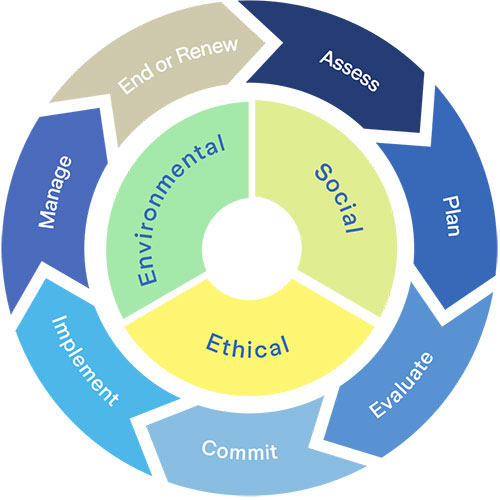Spotlight on Environmental
We are prioritizing emissions reductions across our own operations in line with science-based targets while also engaging and supporting other stakeholders across our value chain, such as our suppliers, with their own transitions.
Based on these principles, we firmly believe that our suppliers should take steps to reduce the environmental impact arising from their operations and we're proud to have been recognized by CDP for our work engaging with suppliers to tackle climate change.
Net-zero supply chain
We are looking to our supply chain to set emissions reduction and net zero targets. Our goal is for 75% of our managed procurement spend2 to be with suppliers that have science-based3 targets by 2025 and net zero targets4 by 2030. We aim to use our influence and press for change, expecting suppliers to set their own targets.
As at the end of 2023, 52.1 percent1 of our managed procurement spend2 is with suppliers who have set science-based targets3 and 49.4 percent1 of our managed procurement spend2 is with suppliers who have set net-zero targets4.
Helping suppliers reach net-zero
Zurich is providing tools and resources to help its suppliers decarbonize their operations. This engagement reflects Zurich’s overarching ambition to become a net-zero emissions business and to cascade climate action across the supply chain.
The Group is providing climate training materials and teaming up with carbon accounting firm Normative to offer free access to the Business Carbon Calculator. Together, these will help suppliers understand Zurich’s goals, calculate their carbon footprint and obtain a blueprint of practical steps they can take on their own journeys to net-zero operations.
Zurich participates in the supply chain program, run by CDP, a global non-profit specialized in environmental reporting. Zurich invites suppliers to submit their own data to CDP, encouraging suppliers to provide transparent environmental reporting and to take action to reduce their impact for the good of the planet and society. Through engagement in this program, we have access to actual emissions data from suppliers that comprise c.60% of our managed procurement spend2 which allows us to estimate and monitor the emissions relating to our supply chain.
Zurich’s approach to supplier engagement on climate change has received an A rating from CDP and has therefore been recognized with Supplier Engagement Leader status.
Spotlight on Social
At Zurich, we are committed to supporting a fairer, more open and sustainable society and aim to generate positive social impact within the communities that we operate. We expect our suppliers to contribute to society in a positive way by respecting human rights and embracing diversity and inclusion. We also seek out opportunities to engage with social enterprises and diverse companies and recognize the key role that these businesses play in creating social value. We are proud that our work with the social enterprise sector has earned us the highest recognition, platinum status, from the Catalyst Business Commitment (CBC). You can learn more about our approach by watching our social procurement video.
Our work with social enterprises is one example of how Zurich is generating a positive social impact within the communities where we operate. In 2016, Zurich in the UK signed up to Social Enterprise UK’s ‘Buy Social’ Corporate Challenge, which commits a group of high profile companies in different types of industries to spend GBP 1 billion in total on purchasing goods and services from social enterprise companies. These are businesses that reinvest their profits to address social and environmental issues — from homelessness and unemployment to landfill waste and climate change.
Zurich remains committed to foster spending through social enterprises and organizations that commit to donating a portion of profits to achieve social impact. Our spending in the UK with our stationery and talent development provider, Wildhearts Group, has helped transform over 1,000 lives around the world through programs addressing gender inequality and social mobility. Examples include business micro loans to women in developing countries and the provision of free training and education for disadvantaged school children and marginalized groups in the UK and abroad. Our spending in Ireland and Germany with Auticon, a unique, multi-national IT consultancy, which exclusively employs autistic adults as IT consultants and in Ireland with GiveMeTap, who use a portion of the profits generated by selling their water bottles to fund water projects in Africa are further examples of our purposeful engagement with social enterprises.
We are now focused on expanding our engagement with social enterprises throughout the other countries that Zurich operates, leveraging our award winning experience from the UK. We are part of a pilot, led by Social Enterprise UK with the support of Euclid Network, the European Social Enterprise Network and Social Enterprise World Forum (SEWF), which aims to make it easier for corporations to engage with social enterprise suppliers across the whole of the EU + Switzerland region.
Our work with diverse suppliers is another example of how we generate positive social impact within the communities that we operate. We regard as diverse any company that is owned, controlled or managed at least 51% by one or more minority, woman, LGBTQ+, veteran, service-disabled veteran, person with a disability, aboriginal-indigenous person, or a historically underutilized business defined under applicable country specific rules.
We are initially focusing on engagement with diverse suppliers within the supply chains of our businesses in North America, the UK and Australia. In these countries, Zurich has operations of material significance to the Group and there are established bodies for the certification of diverse suppliers. We do this by measuring our spend with diverse suppliers and actively identifying opportunities for diverse suppliers to supply goods and services to Zurich. To support us with this initiative, Zurich has memberships with certain non-profit advocacy groups that are dedicated to the promotion of diverse companies. We have an ambition to expand the scope of this initiative into other countries where Zurich operates in the future.
- Supplier Diversity in North America
Zurich North America has partnered with Supplier.IO, in order to access its database of certified diverse suppliers. The Supplier.IO database is used by Zurich and many other companies when seeking qualified diverse suppliers to consider when sourcing products and services.
If you are a diverse or minority small business and would like to make information on your company available to Zurich and the other companies that access Supplier.IO’s database, please determine your eligibility and register as a supplier with Supplier.IO
- Supplier diversity in the UK
Zurich UK is committed to increasing its engagement with diverse suppliers and has partnered with Minority Supplier Development UK (MSD UK) in order to access its network of ethnic minority owned businesses.
If you are an ethnic minority owned business and would like to make information on your company available to Zurich and the other corporate members, please determine your eligibility and register as a supplier with MSD UK
- Supplier diversity in Australia
Zurich Australia is committed to increasing its engagement with diverse suppliers and has partnered with Supply Nation in order to access its network of Aboriginal and Torres Strait Islander owned businesses.
If you are an Aboriginal and Torres Strait Islander owned business and would like to make information on your company available to Zurich and the other corporate members, please determine your eligibility and register as a supplier with Supply Nation.
When working with suppliers, we apply our third-party governance framework (TPGF), which establishes a framework of Group minimum standards for onboarding and management of third parties we work with. The TPGF adopts a risk-based approach to human rights due diligence and is underpinned by an annual risk assessment. The first step is to analyze the human rights set out in the United Nations Declaration of Human Rights, and seek to identify which, if any, of these fundamental human rights could be adversely impacted in our tier-one supply chain, i.e. those suppliers with whom we have a direct buying contract. Our initial and subsequent analysis identified a limited potential for non-respect or potential adverse impacts on human rights. We also concluded that our supply chain presents overall low exposure to non-respect or potential adverse impacts on human rights and that the labor standards and workplace practices operated by our suppliers are a critical factor in the likelihood of adverse human rights impacts occurring. In 2023, we also conducted a separate assessment in the context of child labor5, which resulted in the conclusion that there is no reasonable suspicion of child labor within our supply chain.
To support our risk assessment, we maintain a database of high-risk countries and high-risk goods and services based on data and reports from reputable NGOs and our own internal expert judgement. Our assessment of high-risk goods and services categories is based upon the prevalence of human rights issues reported and an assessment of working practices at industry or sector level.
Our assessment of high-risk countries is based on:
- The reported prevalence of human rights issues.
- The degree of respect for worker rights, based upon local laws and actual practices.
- The extent of political freedom and civil liberties.
- The extent of corruption.
The aim of our human rights due diligence is to validate that the supplier has implemented measures to respect fundamental human rights. Accordingly we have a referral process in place to investigate or to resolve, as appropriate, any red flags identified during the due diligence process. We also use a software tool that uses artificial intelligence to screen news reports, social media posts and NGO reports to monitor potential ESG-related (including human rights) supply chain issues. We also published a course covering the supplier due diligence processes (including in relation to human rights) that have been implemented under the TPGF. The completion rate of the supplier due diligence training for calendar year 2023 is 100 percent.
Spotlight on Ethical
At Zurich, we care about doing the right thing and embrace high standards of business conduct. We endeavour to work with suppliers who share our values, and we expect high standards of ethical conduct from those who represent us or do business with us.
We have developed a third-party governance framework (TPGF), which provides a framework of minimum standards that apply to the onboarding and management of third parties with which we work, including suppliers. The TPGF adopts a risk-based approach to establish onboarding and management measures, such as third-party due diligence processes, that are relevant and proportionate to the nature and risk of any particular transaction. We consider supplier alignment with the SCOC as part of our due diligence processes and request selected suppliers to complete a self-assessment covering our ethical expectations including those relating to protecting peoples personal data, retaining records and whistleblowing.
We have a referral process in place to investigate or resolve, as appropriate, any red flags identified during the due diligence process. We also use a software tool that uses artificial intelligence to screen news reports, social media posts and NGO reports to monitor potential ESG-related supply chain issues. We additionally seek to include specific provisions within our supplier contracts requiring suppliers to embrace ethical business practices. From time to time, we may conduct audits or follow-up reviews on these topics with our suppliers.
1 The spend of approximately USD 2 billion annually managed by Zurich’s Procurement and Vendor Management function according to the 2022 baseline on goods and services that are required to enable Zurich to maintain and develop its operations, excluding suppliers no longer active in the year of reporting.
2 The spend of approximately USD 2 billion annually managed by Zurich’s Procurement and Vendor Management function on goods and services that are required to enable Zurich to maintain and develop its operations.
3 We consider a supplier to have science-based targets when their emission reduction targets are approved by the SBTi, a similar scientifically accredited body or otherwise require a reduction of at least 42 percent in scope 1 and 2 emissions.
4 We consider a supplier to have net-zero targets when their net-zero target is approved by the SBTi, a similar scientifically accredited body or otherwise has a public target to neutralize any residual scope 1 and 2 emissions.
5 Pursuant to the Swiss Ordinance on Due Diligence and Transparency in relation to Minerals and Metals from Conflict-Affected Areas and Child Labor.





